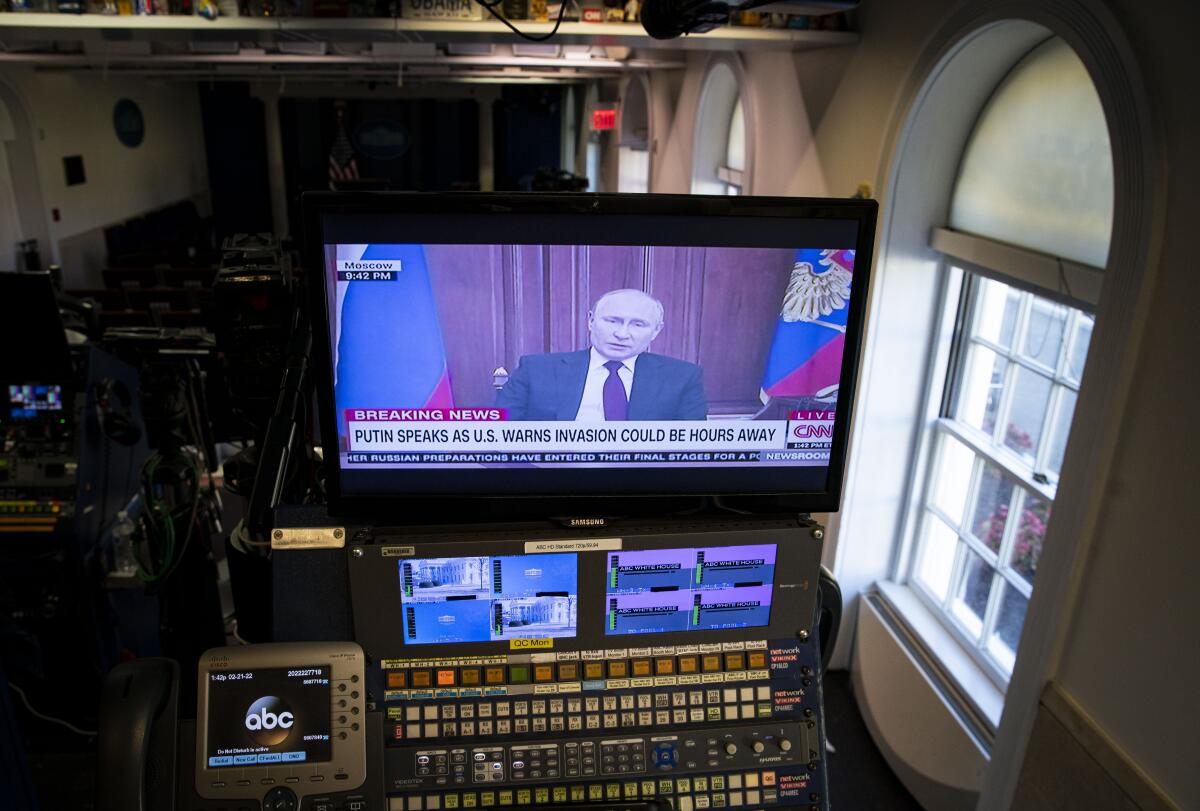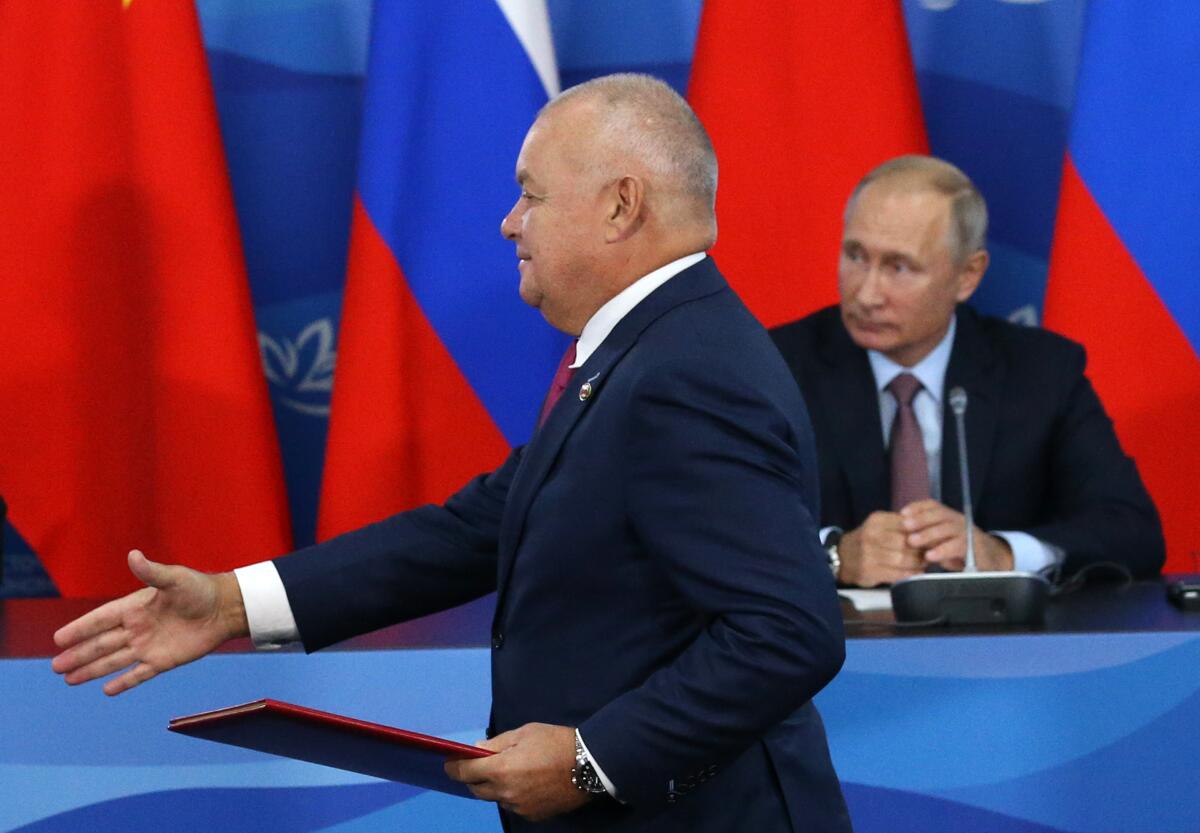Russia’s prince of propaganda spins Putin’s Ukraine war

- Share via
BERLIN — Anyone wanting to know the Kremlin’s worldview need only tune in to “News of the Week,” a Sunday night talk show hosted by Dmitry Kiselyov, who warns his millions of viewers of the sobering specter that the U.S. is an imperial power, Ukraine is ruled by fascists, Europe is a decadent mess in swift decline and Russia has too many enemies to count.
“The operation to clear Ukraine of Nazis continues,” Kiselyov, dressed in a dark suit, white shirt and light blue tie, informs his audience on state-run Russia-1. His nation’s military strategy is “microsurgical ... and methodical,” the TV host says in a staccato-style burst of sentences he has honed for years as Russian President Vladimir Putin’s chief opinion shaper.
“Fever is no helper,” he adds, underscoring the need for a dispassionate and calculated army mission. The statements are followed by video showing the precise attacks on Ukrainian military facilities. No word about the Russian shelling of homes, hospitals, schools, the near-destruction of the cities of Mariupol or Kharkiv and the more than 3 million refugees created by Moscow’s invasion of its neighbor. And not even a hint of Russia’s battlefield failures.
The 67-year-old Kiselyov is a household name and an aging prince of propaganda. Prone to tirades and myth peddling, he once suggested that Russia could turn the U.S. “into radioactive ash.” He was appointed in 2013 by Putin to head Rossiya Segodnya, the powerful media group that controls much of the Kremlin’s ultranationalist spin. Ki- selyov has no qualms about quoting out of context, masking the political affiliations of his guests and picking aspects of a story that fit his narrative while blowing up facts that don’t conform.
On Sunday, “News of the Week,” known in Russian as “Vesti Nedeli,” intensified its populist rhetoric when it featured a segment on alleged Russophobia that included quotes from Ramon Serrano Suner, a follower of Spain’s fascist Gen. Francisco Franco, and Joseph Goebbels, Adolf Hitler’s infamous minister of propaganda. To add a more recent anti-Russian statement, Kiselyov took to Rod Liddle, a controversial British journalist. The intent was to create a siege mentality that feeds into the Kremlin’s central theme: The West wants to bring Russia to its knees.

“With the help of the West, Ukraine staged a coup d’etat,” said Kiselyov on a recent show, giving his version of events in 2014, when the Ukrainian parliament voted to remove then-President Viktor Yanukovich, a Russian ally, from his post. Showing marches of right-wing groups in Kyiv, Ukraine’s capital, Kiselyov insinuated that the country’s new leadership “idolized” Hitler’s SS, the paramilitary organization of the Third Reich. He does not mention that President Volodymyr Zelensky is Jewish and lost relatives in the Holocaust.
“People like Kiselyov are not journalists,” says Russian journalist Dmitry Kartsev. “They are propagandists.”
Kartsev heads the department of analysis at Meduza, a Russian-language online news portal operating from the Latvian capital, Riga, and working mostly for the audience in Russia. Until last year, Meduza ran an office in Moscow but had to abandon it after pressure on the independent press increased. After it was labeled a foreign agent by Russian authorities, advertisers abandoned Meduza, forcing it into exile.
“Russians understand that this is propaganda, but they also believe that there is no free media anywhere at all, neither in Russia nor in the West, and [that] is one of the main achievements of the Kremlin’s propaganda,” Kartsev says. This is true in particular of those Russians who lean toward Putin but are not yet entirely convinced. “If everybody lies, they think, then we should support ‘our son of a bitch,’” he explains.
Kiselyov is not the only star propagandist. Vladimir Solovyov hosts a debate show on Russia-1, where he lashes out against Ukraine. Shortly before the invasion he said: “We have enough firepower for the full annihilation of the Ukrainian military infrastructure without an incursion of forces into Ukrainian territory. But we aren’t preparing to do this.” A few days later he added: “Today is the day that a righteous operation was launched for the denazification of Ukraine.”
The role of TV has long been crucial in shaping Russian public opinion. Its influence has grown since the invasion of Ukraine and the silencing of alternative media sources. Most Western-run social media such as Facebook or Instagram are banned. YouTube appears to be on the verge of being banned. Twitter has been slowed down significantly. According to a recent report, Chinese TikTok does not allow any foreign content anymore for users in Russia. Foreign broadcasters such as Germany’s Deutsche Welle were forced to shut down their Moscow offices.
A number of foreign correspondents based in Moscow have temporarily left the capital over fears they might face 15 years in prison for violating a new law that forbids contradicting the Kremlin’s language rules, which, for example, prohibit the use of “war” and “invasion” to describe the aggression against Ukraine. Instead the conflict must be referred to as a “special operation.”
Independent media are near extinct. Radio station Ekho Moskvy (Echo of Moscow) and the online TV program Dozhd (Rain) closed this month. Only the intellectual Novaya Gazeta is still standing, which may have to do with the fact that its editor in chief, Dmitry Muratov, was awarded the 2021 Nobel Peace Prize. Muratov has said he is auctioning off his medal to help Ukrainian refugees. The last president of the Soviet Union, Mikhail Gorbachev, owns about 10% of the publishing house, but it is unclear how long this will shield the newspaper from closure.
“Any people, and particularly the Russian people, will always be able to tell apart the patriots from the scum and traitors and spit them out like a fly that accidentally flew into their mouths,” Putin said in a speech last week. He continued: “I am convinced that this natural and necessary self-cleansing of society will only strengthen our country, our solidarity, cohesion and readiness to meet any challenge.”
That was apparently an attack on dissidents, antiwar protesters and non-state media voices.
“Western social media were the big challenge for Russian TV,” says Tamina Kutscher, editor in chief of dekoder.org, a platform based in Berlin that, among other things, monitors media in Russia and Belarus. “But those are now gone.” What is left are platforms such as Odnoklassniki or Vkontakte, Russian social media sites whose owners have close ties to the Kremlin.
“What happens to data and statements published on those sites one never knows,” says Kutscher.
There is also a psychological factor at play, Kutscher says: “When the war began this was a moment of shock and people were ready to believe what the propaganda told them.”
One of the recurring lines manipulates World War II history by suggesting that Ukrainians are fascists. “Putin is clearly tying in here with the legacy of the Nazis,” Kutscher says.
The same theme seems to be at work when Russians are asked whether they support the war. According to the Levada Center, an independent pollster in Moscow, 67% of Russians are in favor of the war in Ukraine.
Levada’s director, Lev Gudkov, sees a clear connection between propaganda and public opinion. “Most of the people do not have another choice than to watch and read state media,” he said. “And they all tell the same story.”
When Dmitry Kiselyov ends his nearly four-hour-long program, there is no word about antiwar protests on the streets of Moscow or about Marina Ovsyannikova, the journalist with Russia’s state-run Channel One who last week interrupted a live news broadcast by holding up a sign condemning state propaganda. There is also no mention of the scores of Russians fleeing their country.
Instead he says: “No other Western leader has as much support as Putin.”
For Dmitry Kartsev in Riga, all this comes as no surprise: “If you live in an authoritarian state you better say what is expected of you,” he says.
Ziener is a special correspondent.
More to Read
Sign up for Essential California
The most important California stories and recommendations in your inbox every morning.
You may occasionally receive promotional content from the Los Angeles Times.










